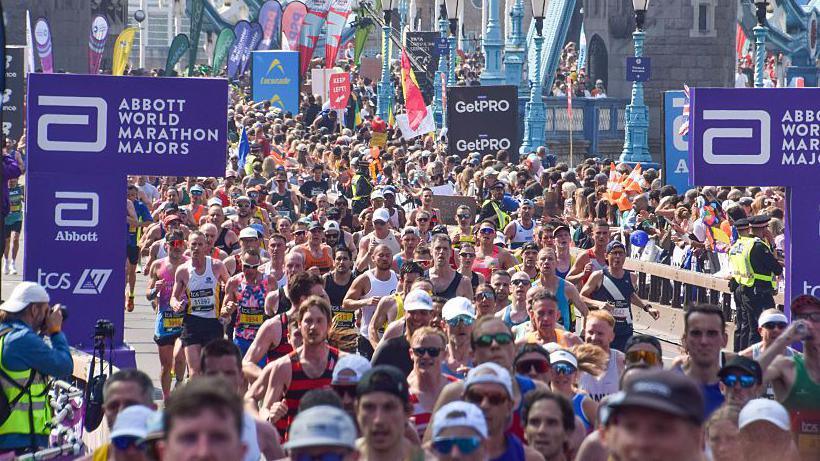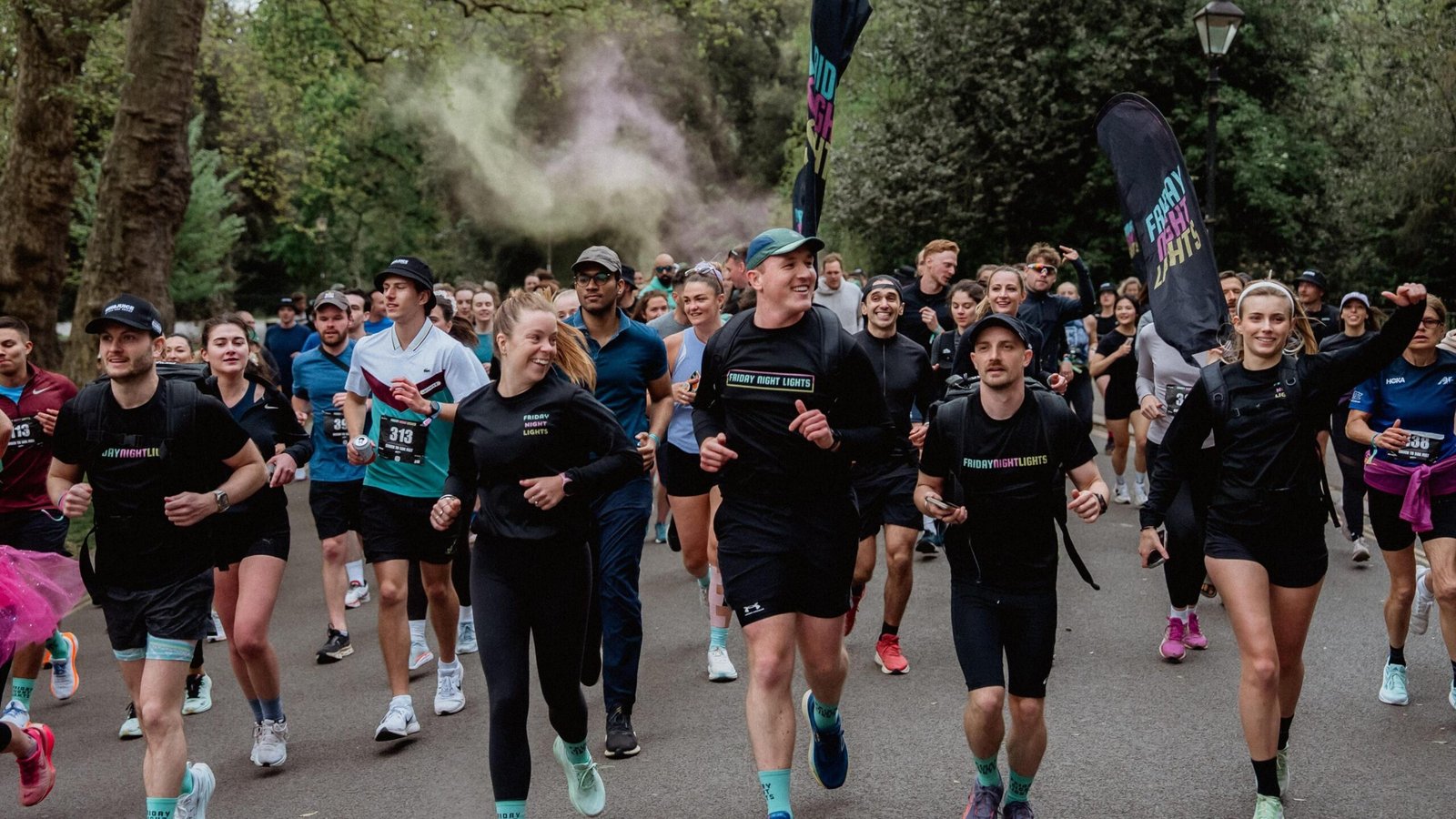 Getty Images
Getty Images- 3 hours ago
A record number of people have applied to take part in the 2026 London Marathon.
Event organisers said more than 1.1 million applications had been received, smashing the previous record of 840,318 set by last year’s ballot.
Last Sunday, more than 90,000 people took on 26.2 miles across both London and Manchester marathons – the largest day of marathon running ever to take place in the UK.
So, is the UK experiencing a running boom? And, if so, why and who is driving it?
What’s getting the UK running?
 Friday Night Lights
Friday Night LightsWhen you dig into what’s happening, some aspects really stand out:
The increase in runners is driven by women.
The UK’s most popular distance is 10km, and events are widespread across the country.
Parkrun has grown to 450,000 participants per week.
Run clubs have popped up around the country as younger generations focus on fitness and shun traditional drinking cultures.
And as for the truly dedicated, more than 2,000 people – up from 97 a decade ago – have now completed a sweep of six prestigious marathons.
But let’s start with that female boom.
From being banned from longer races to marathons
Believe it or not, until 1975 women in Britain were banned from competing in running road races longer than 6km, with female runners making up just 4% of the 7,000-strong field at the inaugural London Marathon.
In this year’s edition, 45% of the 56,640 participants were women – and women made up 49.55% of UK applications for the 2026 ballot.
Molly Slater-Davison set up women-only run club These Girls Run in 2021, driven by her own struggle to find a welcoming local club and some negative running experiences including catcalling and being followed.
Operating under the slogan “safe, sweaty and supportive”, These Girls Run has seen much of its growth through social media and now has record attendance numbers at all nine of its locations across the UK.
“It’s that social effect – ‘if my friend’s doing it, then I can’,” said Slater-Davison.
“People starting to do 5km and sharing it on social media, then sharing their journey to a longer distance run has really helped women to feel like, ‘oh, this is something that I can do’.
“For a lot of women, you do PE at school and you usually have a terrible time, then you go through puberty and you don’t really exercise. There’s lots of research that shows us women and girls drop out of sport at an early age and then don’t pick it back up again. Whereas with running, if you’re with a group of women, it can just feel much more friendly, safe and supportive.”
Why Parkrun average time is getting slower
A key reason for the surge in running is the increased number of events on offer, with more people than ever taking part in them.
Parkrun has played a huge role in turning us into a nation of runners.
Twenty-one years ago, it launched its first run with just 13 runners and five volunteers at London’s Bushy Park. Now, there are more than 2,500 events globally with an average of 450,000 participants every week.
The appeal of Parkrun is the emphasis on participation – everyone is equal, whether you walk or run.
As more people take part, the average finish time continues to slow. Last month it was 33 minutes, compared with 22 minutes in 2005 – something organisers say they are “really proud of”.
But away from a 5km in your local park, the number of applicants for the London Marathon suggests we are particularly enthusiastic about endurance.
According to England Athletics, the most popular running distance is 10km, closely followed by half marathons, then ultramarathons – defined as any distance beyond the traditional 26.2 miles.
The number of registered grassroots athletics clubs is also at an all-time high, with England Athletics telling BBC Sport the grassroots athletics scene is “flourishing” and “stronger than ever”.
At the marathon distance, the chance to earn the coveted Six Star Medal awarded to runners who complete all six of the world marathon majors – Tokyo, Boston, London, Berlin, Chicago and New York City – has exploded in demand over the past 10 years.
In 2015, there were just 97 Six Star finishers from the UK. After last week’s London Marathon, there were 2,023.
But don’t worry if pavement-pounding is not your thing – there really is a race for everyone somewhere in the world.
You could join a Santa run on the Isle of Skye, race horses or even a train in Wales, or carry 50kg of coal on your back uphill in Yorkshire. Or, if you like the finer things in life, how does traversing 26.2 miles through Bordeaux’s vineyards in fancy dress, sampling wine and cheese at each fuelling station, sound?
‘Something social that doesn’t wreck the weekend’
The benefits of running are well documented, for both physical fitness and mental health. Many people turned to running during the pandemic as a way to stay active, but five years on the trend has stuck around, in turn becoming more of a lifestyle than a sport.
The younger generations are embracing that lifestyle more than anyone else. Gen Z and millennials are increasingly trading late alcohol-fuelled nights for early-morning endorphin highs to take part in run clubs and earn virtual kudos on fitness apps like Strava.
Friday Night Lights stage 5km and 10km events in cities across the country for tens of thousands of people, sold with the promise of attending “the UK’s healthiest night out”. Such is the demand among 18-34 year olds for running that London Marathon Events has recently invested in the concept.
“The growth has been rapid and proof that people are crying out for something social that doesn’t wreck their weekend with crippling hangovers,” Friday Night Lights founder Charlie A told BBC Sport.
“We’re not about running fast, far or doing reps. We’re just running for the sake of it. Running to have fun. Running to make friends. Running to enjoy some loud music.”
One million of us now consider ourselves runners
Running hasn’t always been popular.
It wasn’t until the mid-late 1970s when a jogging boom took off across the UK.
Inspired by trends in the United States, there was a surge in interest in road running as a leisure activity and way of keeping fit and healthy.
An estimated one million people now consider themselves to be runners, taking part in new events from fun runs to marathons.
This growth is underlined by the London Marathon ballot today.
In the first London Marathon in 1981 just over 7,000 people took part.
Fast-forward four decades and more than one million people have entered the 2026 London Marathon ballot alone.
The growth in demand reflects the nationwide trend for being active. As a society, we are generally moving more now than ever before. According to last month’s Sport England Active Lives survey, the number of people playing sport and taking part in physical activity between November 2023 and November 2024 in England was at the highest level on record.
And while the number of adults who run is under the pre-pandemic peak of seven million, according to Sport England, it has grown 350,000 year on year to six and a half million.
This suggests that, while the overall number is not as high as it has been, many of those who run do with more fervour than before, given the growth in the participation at events.
Elite runner Phily Bowden, who was the third British female home in last Sunday’s London Marathon elite race, said: “I like to say I was there before it was cool.
“It’s definitely growing.
“When you first start running, if you’re not fit and you don’t do any cardio, it is hard and it’s not necessarily going to be super fun for the first six to eight weeks.
“But once you get a level of fitness and you can actually just go outside and enjoy a run or enjoy a session, it’s the best thing. So I love that other people have tapped into that and discovered that.”
So is just a fad or will it stick around?
Bowden, who has her sights set on another marathon major this year, thinks it’s here to stay.
“We’ve all seen how running can help our mental health and how it can be a really great part of our routine. So I hope as long as the memories of that live on, the running stays.
“I think now that the running clubs are bigger, there are more people doing it and there are more people sharing on social media, hopefully that’s enough to keep that trend going.”





